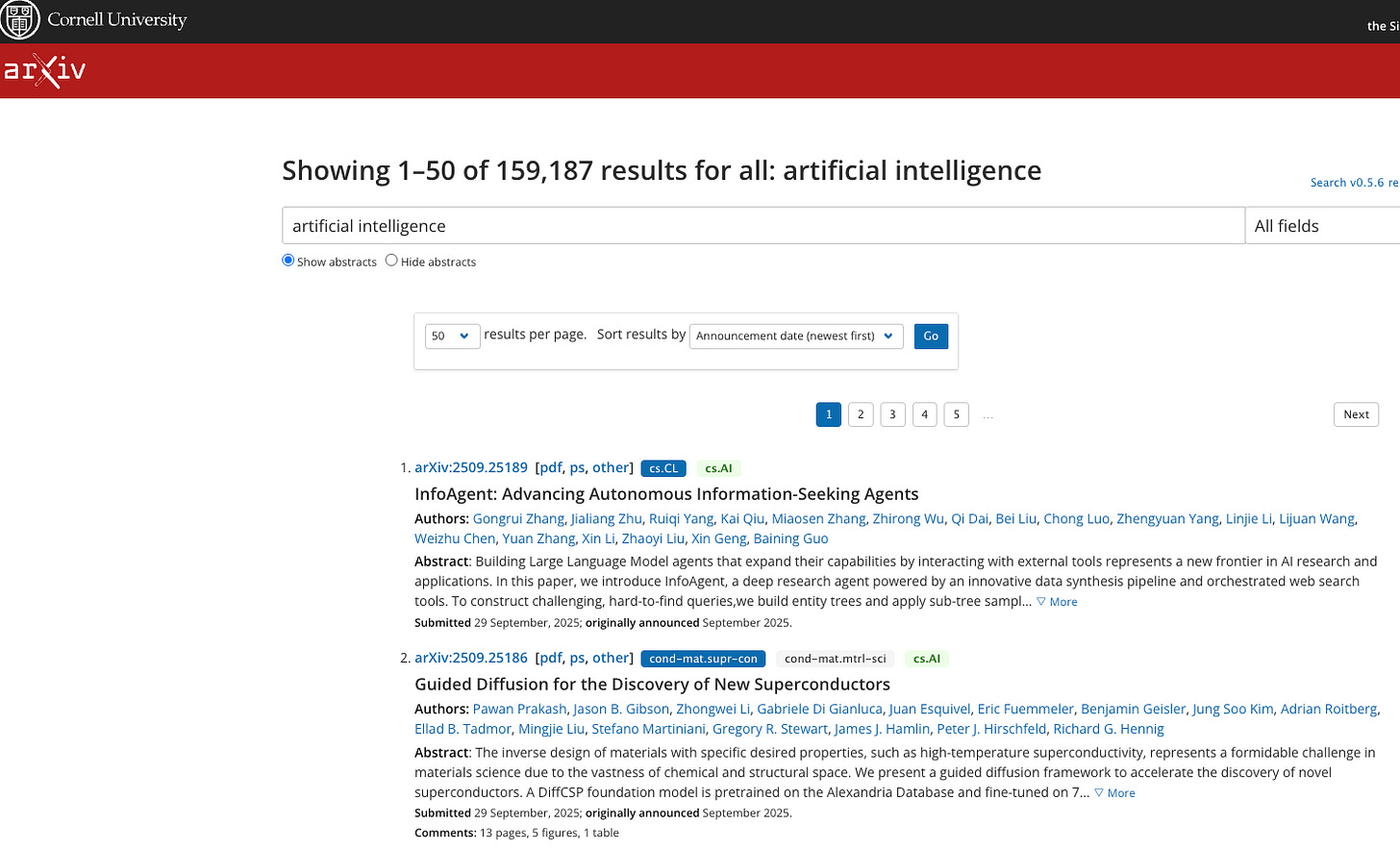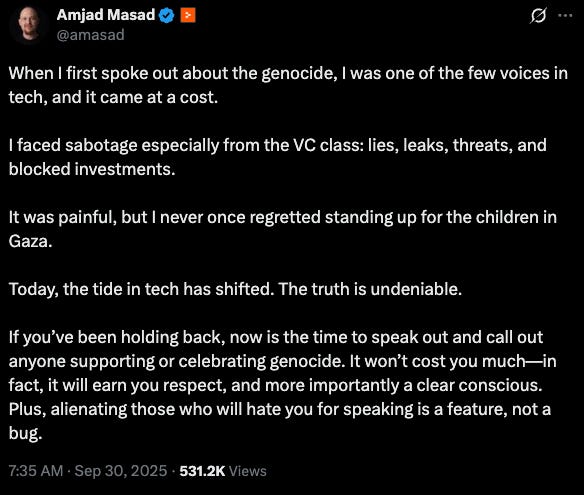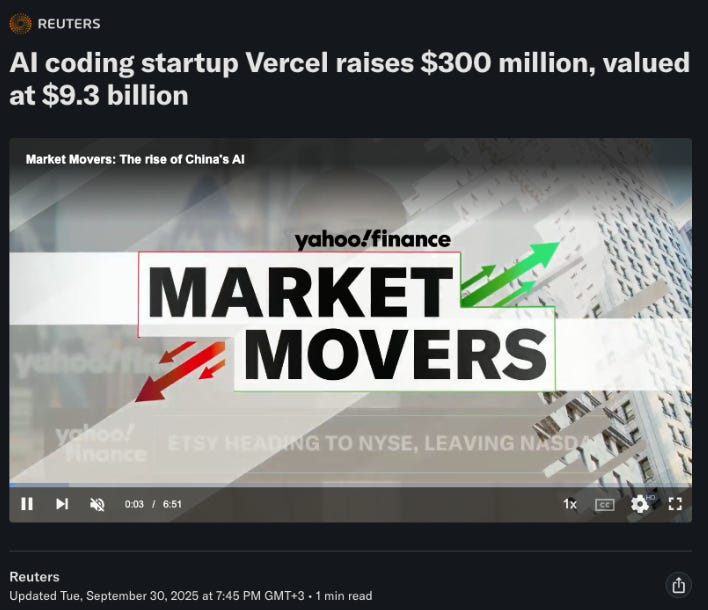Startup Nation or Super-Sparta?
Notes, anecdotes, and data from a super-stressed out hi-tech state
Welcome to Israel Tech Insider. I’m Amir Mizroch, a communications advisor, writer, and former EMEA Tech Editor at The Wall Street Journal. This newsletter is about connecting the dots to give you a sharp, insider’s take on what’s really going on in Super-Sparta, erm, I mean Startup Nation.
As always, feedback to amir@israeltechinsider.com
Israeli AI Researchers Face New Publishing Dilemma
Israeli AI researchers are reconsidering a basic academic practice: uploading papers to arXiv, the open-access platform where scientists share work before formal publication.
arXiv serves two functions. It timestamps research to establish priority—proof that you had the idea first. And it makes work visible to the global research community immediately, rather than waiting months for conference acceptance.
For Israeli researchers, that visibility now carries risk. Academic conferences use double-blind review—neither authors nor reviewers know each other’s identities. But if you upload your paper to arXiv before the review process, your name and institutional affiliation become public. Reviewers can find it. And some Israeli researchers, like many others in the academic and broader tech industry, believe their nationality—until recently a byword for startup excellence— now works against them.
“I encountered the claim that it is recommended to avoid uploading papers submitted to conferences to arXiv, to avoid exposure to reviewers with anti-Israeli tendencies,” one researcher wrote in an Israeli tech forum. Another asked how to present postdoctoral work without mentioning their Israeli affiliation after facing rejection.
The debate reflects a bigger shift: almost 2 years into the October 7th War, Israel’s global reputation, its war economy, and severe internal stresses, are taking a toll on its tech industry.
“Since the events in Gaza it’s harder to find collaboration with foreign universities—both the atmosphere and funding have dropped.”
Investors who previously engaged with Israeli startups now ask more questions. Some Israelis report feelings of being “singled out” or treated differently in international research forums, conference reviews, or funding decisions, prompting advice on how to present one’s institution and nationality more neutrally. Some mention being passed over for foreign roles or losing remote contracts.
“Does anyone know how to present my postdoctoral work without mentioning I am from Israel? I got a rejection last time.”
The growing concern over global isolation—supercharged by Netanyahu’s recent Super-Sparta remarks—is reflected across Startup Nation’s tech Facebook groups, which are a virtual water-cooler where you can tap into the dominant conversations on the minds of Israeli techies. [[If you’re new to my reporting from these groups, check out Israeli Tech’s HR Horror Show]].
Academic researchers face competing pressures. Upload to arXiv too early, and you expose your identity during blind review. Wait until after acceptance, and you lose the timestamp that protects your work if someone else publishes similar research first. Upload anonymously—stripping your name and affiliation—and you risk someone taking credit for your ideas if the paper doesn’t get accepted.
AI research, because of its growing salience in everything from chatbots to killer satellites, requires showing up openly in global forums and being peer-reviewed without political bias. The question isn’t whether Israeli researchers can adapt—they clearly are. The question is whether adaptation under isolation produces the same results as operating at full capacity in global networks. The answer will show up in publication rates, collaboration networks, and funding flows over the next year.
The fact that this trade-off even exists tells you something about what it’s like out there for Israeli talent.
CEO Selfie With PMO
The guy with the mustache is Guillermo Rauch. Argentina-born Guillermo is the founder and CEO of a Silicon Valley-based startup called Vercel that helps developers build websites and applications, including tools powered by artificial intelligence. Its customers include OpenAI, Anthropic, PayPal, Nike and Walmart.
On Monday (September 29, 2025) Guillermo posted a photo from a New York meeting with Prime Minister Netanyahu.
“Enjoyed my discussion with PM Netanyahu on how AI education and literacy will keep our free societies ahead. We spoke about AI empowering everyone to build software and the importance of ensuring it serves quality and progress. Optimistic for peace, safety, and greatness for Israel and its neighbors.”
Empowering literacy, free societies, building quality software, optimism, peace, safety…who could argue with that??
A lot of people, apparently. The post prompted backlash from developers accusing Rauch of supporting Netanyahu’s policies (they used harsher words). A Vercel employee named Wesam resigned publicly, several users canceled subscriptions, and Google Trends showed a fivefold surge in searches for Vercel alternatives.
One of those alternatives is a company called Replit, run by a guy called Amjad Masad, who, you would be surprised to learn, is openly anti-Israeli.
Amjad jumped at his chance to globalize his intifada by offering to migrate, at his own expense, anyone quitting Vercel over to Replit. He made a video, turned it into a Migration Guide, and went viral. Respect. The dopamine hits must have been epic.
The next day Guillermo and Vercel delivered their answer to Amjad and his like-minded filter-bubble buddies.
How do you like them apples, Amjad?
How important is tech to Israel’s economy?
Latest numbers by Jefferies, the investment bank, on just how critical Israel’s technology sector is to the country’s economy:
~20% of GDP
64% of exports
12% of workforce is employed in the high-tech sector
25% of income taxes
30% of the market cap on the TASE
Mr. Security Committee
When leaders can’t choose, they convene—and Benjamin Netanyahu has elevated this evasion into an art form. His latest creation: the Supreme Armament Council, a new committee to figure out how Israel can make enough bombs and bullets by itself, cutting its reliance on just one or two suppliers (thank you President Biden).
The immediate trigger was Netanyahu’s “Super Sparta” speech blaming civil servants for procurement obstruction, yet the real obstruction sits in his own office: three years ago, an expert commission delivered detailed recommendations for making Israel’s weapons production less dependent on foreign suppliers, but Netanyahu never implemented them—not because bureaucrats blocked the reforms, but because he refused to choose between his finance ministry’s budget discipline and his defense establishment’s spending demands.
The new council covers ammunition production but excludes major weapons systems like submarines, fighter jets, and warships—ensuring it can neither succeed completely nor fail in a way that assigns clear responsibility. Meanwhile, Israel’s ammunition storage remains exposed and domestic production capacity constrained, precisely what that earlier commission was meant to fix (Nagel Commission report). The pattern echoes America’s post-9/11 defense sprawl and Britain’s post-Falklands spending: emotional wartime expansion that erodes the economic base sustaining military power. What Israel needs isn’t another council—it needs Netanyahu to publicly rank defense priorities with locked budget allocations and mandatory parliamentary review. Sometimes effective governance just means forcing leaders to actually govern.







